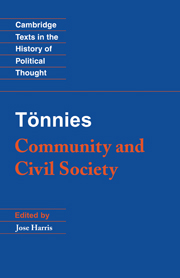Book contents
- Frontmatter
- Contents
- Acknowledgements
- General introduction
- Chronology of Tönnies's life and career
- A note on the texts and further reading
- A note on translation
- Glossary
- COMMUNITY AND CIVIL SOCIETY
- Book One A general classification of key ideas
- Book Two Natural will and rational will
- Book Three The sociological basis of natural law
- Section 1 Definitions and propositions
- Section 2 The natural element in law
- Section 3 Inter-related forms of will – commonwealth and state
- Appendix: Conclusions and future prospects
- Index
- CAMBRIDGE TEXTS IN THE HISTORY OF POLITICAL THOUGHT
Section 3 - Inter-related forms of will – commonwealth and state
Published online by Cambridge University Press: 05 June 2012
- Frontmatter
- Contents
- Acknowledgements
- General introduction
- Chronology of Tönnies's life and career
- A note on the texts and further reading
- A note on translation
- Glossary
- COMMUNITY AND CIVIL SOCIETY
- Book One A general classification of key ideas
- Book Two Natural will and rational will
- Book Three The sociological basis of natural law
- Section 1 Definitions and propositions
- Section 2 The natural element in law
- Section 3 Inter-related forms of will – commonwealth and state
- Appendix: Conclusions and future prospects
- Index
- CAMBRIDGE TEXTS IN THE HISTORY OF POLITICAL THOUGHT
Summary
If the theory that I am putting forward is going to retain the concept of natural law in its twofold sense, it must include the proposition that law can be understood as a collective expression of both natural will and rational will. The root of individual natural will, however, is to be found in the sub-conscious vegetative life, whereas individual rational will stems from the possibility of combining two conscious ideas of similar or competing utility. The root of the will of a Community thus lies hidden in the vegetative life, for family and kinship affairs are ‘vegetative’ in the sociological sense, in that they form the substantive basis of human life together. The root of Society's will, by contrast, is the meeting of individual minds, intersecting at the point of an exchange which is rational or right for both of them. Just as sympathy and mutual understanding are always derived from a more general principle, which we have termed concord, so we have learnt that isolated rational calculation needs the basic conception of the rational will of Society for its complete fulfilment. In the case of natural will, a real objective ‘esprit’ or common spirit arises out of the material life and constitutes its way of thinking and developing.
- Type
- Chapter
- Information
- Tönnies: Community and Civil Society , pp. 222 - 244Publisher: Cambridge University PressPrint publication year: 2001



